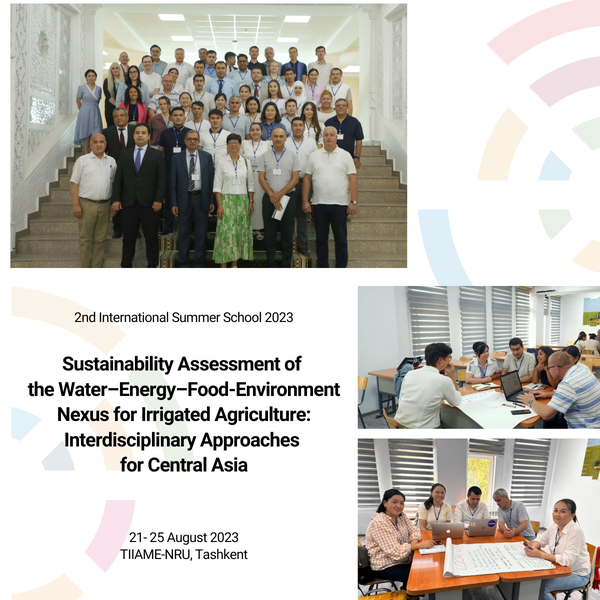04.09.2023 - SDGnexus Network participated in the International Summer School on Sustainability Assessment in Central Asia
Giessen, September 4, 2023 – Members of the SDGnexus Network participated in the second International Summer School 2023, focused on enhancing sustainability assessment within the water-energy-food-environment nexus for irrigated agriculture. This interdisciplinary event took place from August 21 to August 25, 2023, in Tashkent, hosted by the Tashkent Institute of Irrigation and Agricultural Mechanization Engineers - National Research University (TIIAME-NRU).
The event was expertly organized by a consortium of institutions including TIIAME-NRU, the Leibniz Centre for Agricultural Landscape Research (ZALF), the Consortium of International Agricultural Research Centers (CGIAR) NEXUS Gains Initiative, the International Water Management Institute (IWMI), the International Center for Agricultural Research in the Dry Areas (ICARDA), the International Food Policy Research Institute (IFPRI), and the Alliance of Biodiversity International and the International Center for Tropical Agriculture (CIAT).
A Cohort of 31 participants, comprising PhD students and postdocs from Kazakhstan, Tajikistan, Kyrgyzstan, Turkmenistan, Uzbekistan, Ecuador, Pakistan, and the USA, came together to engage in an intellectually stimulating exchange. Representing the SDGnexus Network, Professor Abdulkhakim Salokhiddinov, a Vice-Rector for International Cooperation at TIIAME-NRU (Uzbekistan), Dr. Aslam Qadamov, a Postdoctoral Fellow at the Mountain Societies Research Institute, University of Central Asia (Tajikistan), and Kalina Fonseca, a PhD candidate at Justus Liebig University Giessen (Germany), showcased their expertise. Professor Salokhiddinov delivered a captivating lecture on "Land use and water management in Central Asia," while Dr. Qadamov and Kalina Fonseca presented their research on climate change's impact on water availability, agriculture production in mountainous regions, and nature-based solutions for enhancing water quality in developing communities, respectively.
The Summer School curriculum encompassed not only theoretical knowledge but also practical engagement through field excursions and collaborative group projects. For instance, Kalina Fonseca worked alongside peers from Kazakhstan, Kyrgyzstan, Tajikistan, and Uzbekistan. Their collaborative effort centered on evaluating the sustainability of hydropower development in a transboundary river basin – a case study focusing on the Obi-Zarang River. Through qualitative analysis, the team preliminary examined three distinct scenarios: large-scale hydropower plant construction, small-scale hydropower plant construction, and the absence of construction altogether. The group of Dr. Qadamov worked on improving the food and environmental conditions by intervention in water-energy sectors in the desert of Turkmenistan: a case study from Balkan Viloyat. The group aimed to craft solutions to provide water and energy access to local communities, thus elevating their quality of life and contributing to the region's sustainable development. Dr. Qadamov was particularly impressed by the presentation on the Nexus gains bringing multiple benefits across water-energy-food and the environment and the Nexus game, a practical exercise to understand the complex and dynamic nature of water allocation decisions.
The second International Summer School 2023 not only fostered an environment of collaborative learning but also illuminated the potential for innovative and sustainable approaches within the water-energy-food-environment nexus. By bringing together experts from diverse backgrounds, the event has sowed the seeds for transformative change in the realm of irrigated agriculture.

